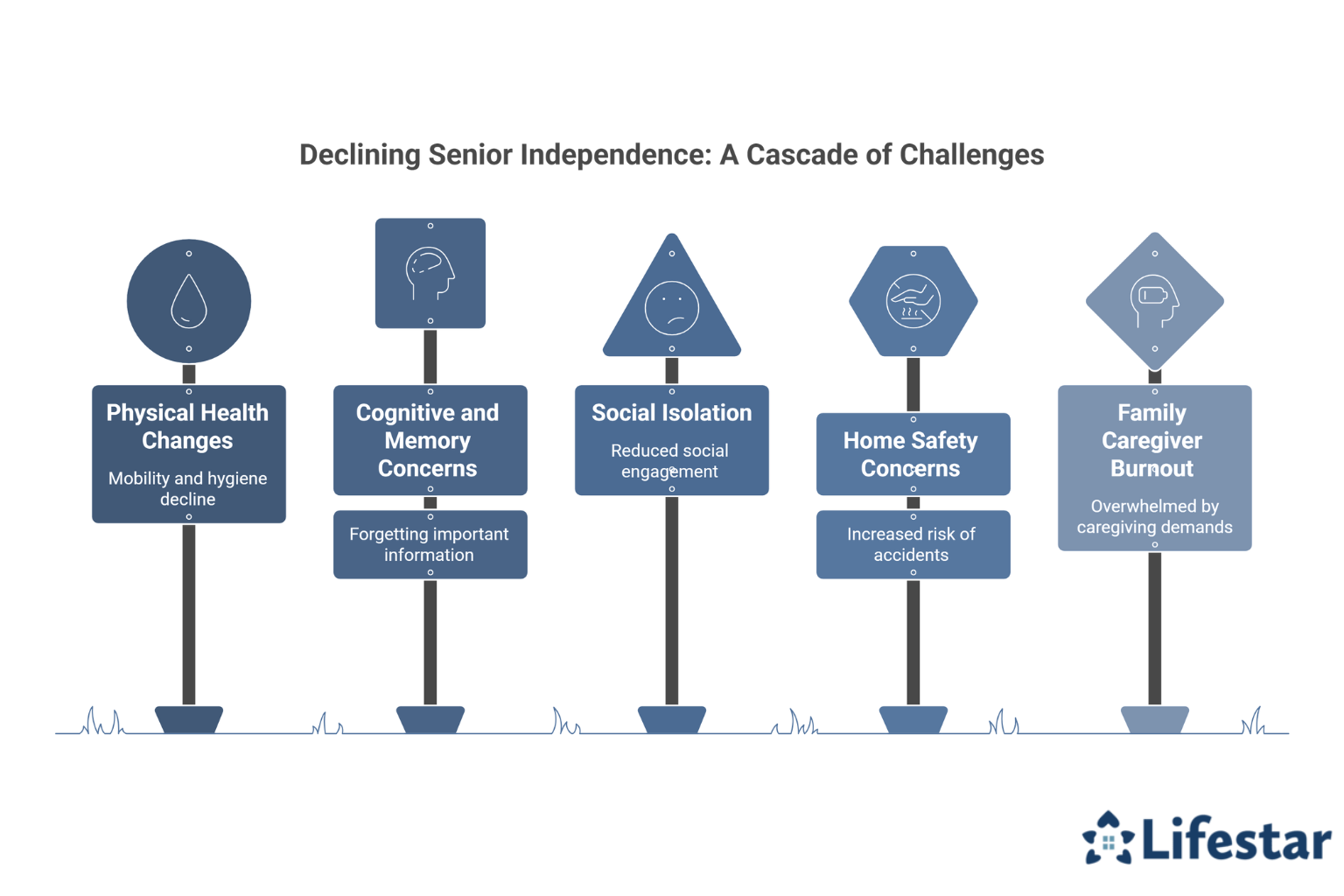
Table of Content
Deciding when a senior loved one needs additional support can be challenging for families. Understanding the key warning signs and changes in daily functioning can help you make informed decisions about senior home care options.
Physical Health Changes
Physical changes often serve as the first indicator that additional care may be beneficial. When seniors have difficulty with basic physical tasks, their safety and wellbeing become primary concerns.
Key physical warning signs include:
- Difficulty with mobility, including frequent falls
- Trouble with climbing stairs or getting up from chairs
- Challenges with bathing, dressing, or personal hygiene
- Unexplained weight loss or poor appetite
- Medication organization errors or missed doses
- Chronic fatigue or weakness affecting daily activities
These physical changes can compromise independence and increase the risk of accidents or health complications. Professional home care can provide assistance with daily activities while allowing seniors to remain in familiar surroundings.
Although it may be challenging to find reliable, highly rated elderly home care, you can turn to Lifestar Home Care. Our caregivers are expertly trained to assist seniors with a wide array of important tasks, including cooking, bathing, light housekeeping, and exercise.

Cognitive and Memory Concerns
Memory loss that disrupts daily life often indicates the need for specialized care. Unlike normal age-related forgetfulness, dementia-related cognitive changes progressively interfere with routine activities and decision-making.
Warning signs that suggest professional evaluation include:
- Forgetting recently learned information or important dates
- Repeatedly asking for the same information
- Difficulty following familiar recipes or managing finances
- Confusion about time, dates, or familiar locations
- Getting lost in previously familiar places
- Problems with judgment or decision-making abilities
When cognitive challenges emerge, families should seek medical evaluation. Early recognition allows for proper planning and helps caregivers understand disease progression, as research shows educated caregivers feel more confident when changes occur.
Social Isolation and Behavioral Changes
Significant shifts in mood, personality, and social engagement can indicate additional support is needed. These changes often occur gradually but may signal underlying health issues or depression.
Behavioral changes to monitor include:
- Withdrawal from social activities and hobbies your loved one once enjoyed
- Increased irritability, anxiety, or suspicion
- Changes in sleep patterns or appetite
- Difficulty adapting to routine changes
- Neglecting personal appearance or home maintenance
- Avoiding family gatherings or social interactions
Professional caregivers can provide companionship and social stimulation while monitoring for concerning behavioral changes that may require medical attention.
Safety Concerns in the Home Environment
Home safety issues often prompt families to consider professional care services. When seniors cannot easily maintain safe living environments, intervention becomes necessary to prevent accidents and injuries.
Common safety concerns include:
- Forgetting to turn off appliances or lock doors
- Poor housekeeping leading to trip hazards
- Spoiled food in the refrigerator or pantry
- Unpaid bills or financial management problems
- Difficulty using the telephone during emergencies
- Wandering or getting lost in familiar areas
Home care professionals can assess safety risks and provide supervision while helping seniors maintain their independence as much as possible.
Not every senior has the same care needs, which means they don’t all need the same type of home care. Oklahoma City families can rely on Lifestar Home Care to provide individualized care plans to meet their elderly loved ones’ unique care needs. Our caregivers help seniors focus on healthy lifestyle habits such as eating nutritious foods, exercising regularly, and maintaining strong social ties, and we offer mentally stimulating activities that can boost cognitive health and delay the onset of dementia.
Family Caregiver Burnout and Stress
The stress and demands placed on family caregivers often indicate when professional help is needed. Caregiver burnout can affect both the caregiver’s health and the quality of care provided.
Signs of caregiver stress include:
- Feeling overwhelmed by caregiving responsibilities
- Neglecting personal health or relationships
- Increased conflicts with the care recipient
- Physical or emotional exhaustion
- Inability to maintain employment or other commitments
- Feeling isolated or unsupported
Professional home care services can provide respite for family caregivers while ensuring seniors receive consistent high-quality care. This support allows family members to maintain their own wellbeing while remaining involved in their loved one’s care.
Family caregivers need to care for their own wellbeing. If you’re caring for an aging loved one and are feeling overwhelmed, consider hiring a professional caregiver to provide respite care. Oklahoma City families who want to prevent burnout can turn to Lifestar Home Care. One of our professional caregivers can assist your loved one at home while you take a nap, go to work, run errands, or go on vacation. To learn about our high-quality in-home care services, give us a call today.